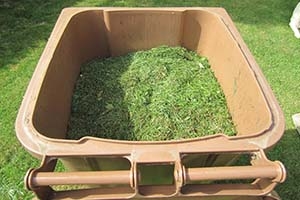Garden Waste bin charges proposed

A proposal to introduce a charging scheme for the collection of Household Garden Waste is to be considered next week (Tuesday 30 January).
West Lothian Council is being forced to reduce spending and change a wide range of non - statutory services due to insufficient funding being provided by the Scottish Government, combined with increasing costs.
Non-statutory services are services which councils are not legally obliged to provide.
The proposal is one of many that, if agreed, would help the council to balance its budget (which is a legal requirement) and still maintain services. It is estimated that West Lothian Council faces a revenue budget gap of £38.2 million over the four years to 2027/28 and significant savings are required. In December 2023, council officers were tasked with identifying potential additional budget saving options to help contribute to balancing the budgets for 2024/25 and 2025/26.
The Environment and Sustainability Policy Development and Scrutiny Panel will consider the proposal next week. A final decision is expected to be made when the council sets its budget in February.
In brief:
- The majority of Scottish councils which collect garden waste charge for the service. Glasgow and Falkirk councils introduced charges last year.
- The proposal to introduce a chargeable garden waste service would generate additional net income of £1.15 million. This income would go towards the cost of providing the garden waste collection service
- Food and garden waste collections currently take place on a fortnightly basis from the brown bin. A chargeable garden waste service would see food waste continue to be placed in the brown bin and collected fortnightly without charge, with the purchase of a permit allowing customers to also place garden waste in the bin.
- Customers would continue to receive a food waste collection in their brown bin whether a permit is purchased or not. If, however, garden waste is placed in a brown bin which does not have a valid permit, then the bin would not be emptied on that occasion.
- It is proposed that permits for West Lothian residents would cost £50 per household per annum, with options to be considered for households with more than one brown bin. This compares with other councils, and anticipated increase in charges in 2024/25 across the 16 councils who charge. It is proposed that all permits will run annually from 1 May to 30 April. It is proposed that the change could be implemented from May 2024.
An estimated 80% of residents currently participate in the garden waste collection service.
Of the Local Authorities who charge for garden waste collections, current charges range from £25 to £60 per bin per annum.
Should residents not wish to have garden waste collected, they would be able to compost their garden waste within their own property or continue to dispose of garden waste for free at one of the council's five Community Recycling Centres.
Jim Jack, Head of Operational Services said: "We've faced significant budget reductions since 2007 and introducing garden waste charges is a proposal that has been discussed many times over the years.
"In an ideal world we would have adequate levels of funding and we would not have to put this proposal forward, but the options available to the council are now very limited. We need to consider all options available to us given the financial challenges we face.
"We've already reduced some non-statutory services to balance our budget but, once again, our funding allocation is less than is required to maintain current levels of service. The levels of service that we are all used to will, unfortunately, change without adequate levels of funding being given to councils.
"Some services are statutory - and we cannot stop or alter these significantly. That means we must look at other services to identify ways to either reduce costs or introduce charging to essentially pay for the service.
"We know that half of Scottish councils already charge for garden waste and I suspect that this number may increase, as all councils have budget savings to make and limited ways to make them.
"We have spoken to many other councils to learn from their experiences. With any change to waste collections, there is always a period of transition, but largely the changes seem to have been implemented successfully in other areas with garden waste collections being maintained.
"Given the financial position that councils, including ourselves, are in, we believe this to be the best way of protecting a much-valued service."



